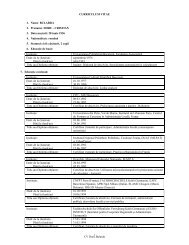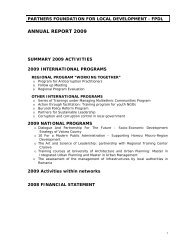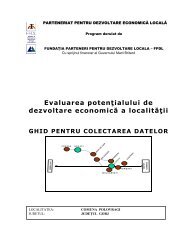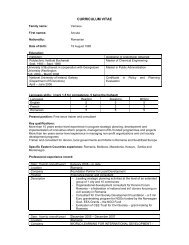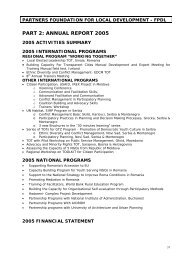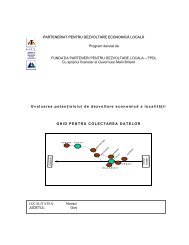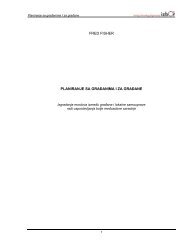Organizational Development: A Manual for Managers and ... - FPDL
Organizational Development: A Manual for Managers and ... - FPDL
Organizational Development: A Manual for Managers and ... - FPDL
Create successful ePaper yourself
Turn your PDF publications into a flip-book with our unique Google optimized e-Paper software.
organization. “In linear systems, ‘negative’ or ‘damping’ feedback is primarily used to bring the<br />
system back into equilibrium. …Your state of mind is ‘what actions can we take to return to the<br />
desired equilibrium?’. ‘Management by exception’ is an example of using damping actions – you<br />
plan to achieve a state of equilibrium <strong>and</strong> act only on deviations from that state, rather than<br />
continuously looking <strong>for</strong> opportunities to improve. In non-linear systems, there is ‘positive<br />
amplifying’ feedback. As the world is seen as inherently unstable, very small actions can be<br />
amplified so that they have major consequences. …<strong>Managers</strong>’ ways of thinking <strong>and</strong> acting are<br />
quite different if they see the world as being in something near stable equilibrium than if they<br />
believe they are operating in chaos.” (Glass, 1998)<br />
We could add to this that managers’ ways of thinking are also quite different if they see an<br />
organization as something where they should organize everything around a certain equilibrium, or<br />
as something where a lot of self-organizing processes take place at all levels <strong>and</strong> these processes<br />
in their own way respond to the chaos wherever it exists <strong>and</strong> whenever necessary. Some<br />
management concepts are very relevant to this second approach - they help build modern<br />
organizations that are able to survive in a stressfully competitive <strong>and</strong> turbulent world.<br />
The first concept is related to teamwork. Conducting training on this topic was exceedingly popular<br />
over the last decades. Un<strong>for</strong>tunately, as with most fads, it was compromised – the deepest sense<br />
of teamwork was substituted <strong>for</strong> socializing issues, building good relations, underst<strong>and</strong>ing, mutual<br />
respect, compatibility, tolerance <strong>and</strong> all other notions available to psychologists who made it their<br />
chief business. Meanwhile, the main reason <strong>for</strong> teamwork is the great synergy effect of<br />
cooperation that emerges when a group functions as a team, <strong>and</strong> the main key to it is relevant<br />
organizational arrangements that allow <strong>and</strong> encourage people to work in teams. When all<br />
necessary organizational conditions are present – the group will become a team; no training is<br />
needed <strong>for</strong> this. However, the team may need training to become more effective <strong>and</strong> successful.<br />
This training might address specific skills that are lacking or problems that the team faces, perhaps<br />
of a social or psychological nature, but often related to structure, responsibilities, in<strong>for</strong>mation<br />
systems or technology.<br />
Another concept was called empowerment. It refers to the authority to make a decision on what to<br />
do <strong>and</strong> how to do it. That used to be the job of a manager in Taylor’s times. But it cannot be any<br />
longer because those who just carry out orders never feel responsible <strong>for</strong> the results from their<br />
actions. When they do things in a way prescribed by instruction – they cannot be responsible <strong>for</strong><br />
their own efficiency. Although both effectiveness <strong>and</strong> efficiency depends primarily on their ef<strong>for</strong>ts –<br />
they do not care about this, because somebody else made the decisions. The brains, skills,<br />
underst<strong>and</strong>ing of a situation, <strong>and</strong> in<strong>for</strong>mation at h<strong>and</strong> among subordinates are at least equal to<br />
what the boss possesses or knows. The balance of capability to know best what to do <strong>and</strong> how to<br />
114



